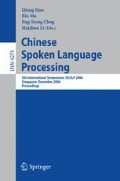Abstract
Prosodic boundary prediction is the key to improving the intelligibility and naturalness of synthetic speech for a TTS system. This paper investigated the problem of automatic segmentation of prosodic word and prosodic phrase, which are two fundamental layers in the hierarchical prosodic structure of Mandarin Chinese. Maximum Entropy (ME) Model was used at the front end for both prosodic word and prosodic phrase prediction, but with different feature selection schemes. A multi-pass prediction approach was adopted. Besides, an error-driven rule-based modification module was introduced into the back end to amend the initial prediction. Experiments showed that this combined approach outperformed many other methods like C4.5 and TBL.
This work is supported by China National Natural Science Foundation(60433030, 60418012).
Access this chapter
Tax calculation will be finalised at checkout
Purchases are for personal use only
Preview
Unable to display preview. Download preview PDF.
References
Cao, J.: Prediction of Prosodic Organization Based on Grammatical Information. Journal of Chinese Information Processing 17, 41–46 (2003)
Gee, J.P., Grosjean, F.: Performance structures: A psycholinguistic and Linguistic Appraisal. Cognitive Psychology 15, 411–458 (1983)
Cao, J., Zhu, W.: Syntactic and Lexical Constraint in Prosodic Segmentation and Grouping. In: Proceedings of Speech Prosody 2002, Aix-en-Provence, France (2002)
Wang, H.: Prosodic words and prosodic phrases in Chinese. Chinese Language 6, 525–536 (2000)
Wang, M., Hirschberg, J.: Predicting Intonational Boundaries Automatically from Text. In: The ATIS Domain Proceedings of the DARPA Speech and Natural Language Workshop, pp. 378–383 (1991)
Taylor, P., Black, A.W.: Assigning phrase breaks from part-of speech sequences. Computer Speech and Language 12(4), 99–117 (1998)
Sheng, Z., Jianhua, T., Lianhong, C.: Learning rules for Chinese prosodic phrase prediction. In: International Conference on Computational Linguistics, Proceeding of the first SIGHAN workshop on Chinese language processing, vol. 18 (2002)
Li, J.-F., Hu, G.-P., Wang, R.: Chinese prosody phrase break prediction based on maximum entropy model. In: Interspeech 2004, Jeju Island, Korea, 729–732 (2004)
Berger, A.L., Stephen, A., Sa, D.P., et al.: A maximum entropy approach to natural language processing. Computational Linguistics 22(1), 39–71 (1996)
Zheng, M., Cai, L.: Prosodic Constituents Segmentation and Syntax of Chinese. In: Proceeding of 5th Chinese Lexical Semantics Workshop, Singapore (2004)
Brill, E.: Transformation-Based Error-Driven Learning and Natural Language Processing: A Case Study in Part-of-Speech Tagging. Computational Linguistics 21(4), 543–565
Chu, M.: The Uncertainty in Prosody of Natural Speech and Its Application in Speech Synthesis. Journal of Chinese Information Processing 18(4), 66–71 (2004)
Author information
Authors and Affiliations
Editor information
Editors and Affiliations
Rights and permissions
Copyright information
© 2006 Springer-Verlag Berlin Heidelberg
About this paper
Cite this paper
Zhang, X., Xu, J., Cai, L. (2006). Prosodic Boundary Prediction Based on Maximum Entropy Model with Error-Driven Modification . In: Huo, Q., Ma, B., Chng, ES., Li, H. (eds) Chinese Spoken Language Processing. ISCSLP 2006. Lecture Notes in Computer Science(), vol 4274. Springer, Berlin, Heidelberg. https://doi.org/10.1007/11939993_19
Download citation
DOI: https://doi.org/10.1007/11939993_19
Publisher Name: Springer, Berlin, Heidelberg
Print ISBN: 978-3-540-49665-6
Online ISBN: 978-3-540-49666-3
eBook Packages: Computer ScienceComputer Science (R0)

